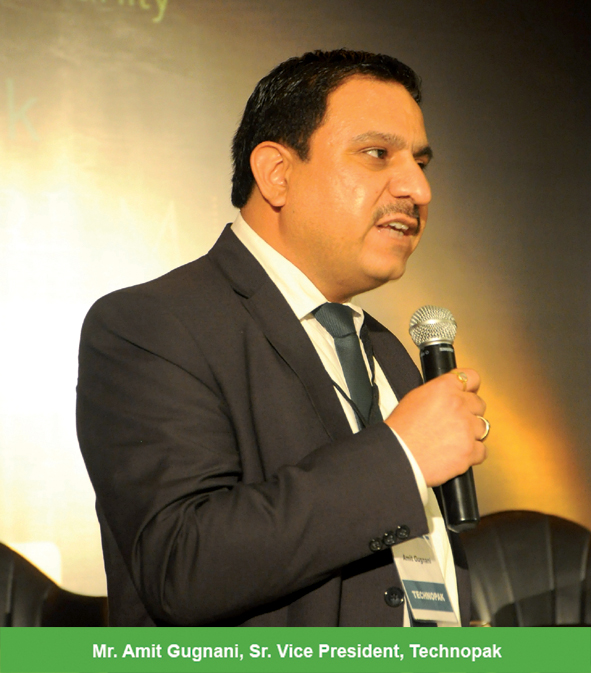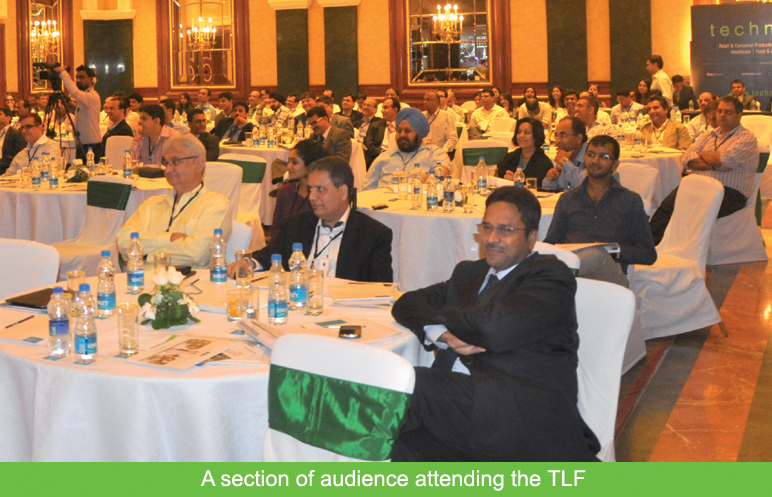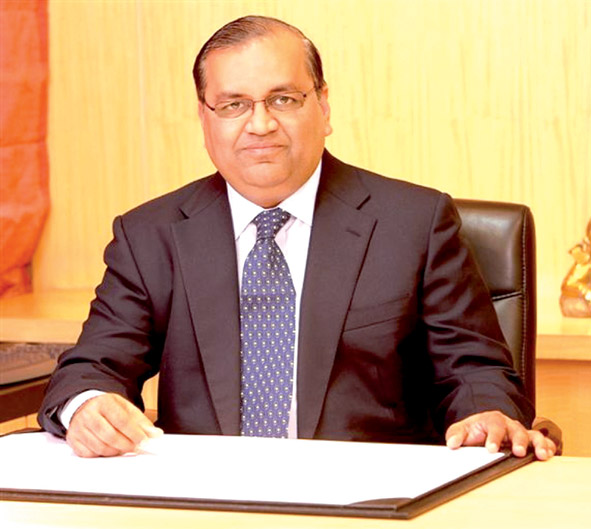 The eighth Technopak Leadership Forum on Fashion- Textiles and Apparel was successfully conducted in Mumbai on July 24. The event had a presence of the who’s who of the textile & fashion industry sharing their wide experience in this field, as they joined Technopak for panel discussions on various issues relevant to the textiles industry.
The eighth Technopak Leadership Forum on Fashion- Textiles and Apparel was successfully conducted in Mumbai on July 24. The event had a presence of the who’s who of the textile & fashion industry sharing their wide experience in this field, as they joined Technopak for panel discussions on various issues relevant to the textiles industry.
Mr. Arvind Singhal, Chairman of Technopak Advisors, welcomed the gathering and also moderated the first session of the day on “India’s Textile & Apparel Industry: Strategy for a stronger and more profitable growth”.
 Some of the renowned panellists and speakers on the occasion were Mr. Bashir Ali Mohammad, President – ITMF & Chairman, Gul Ahmed Textiles Mills; Mr. Dilip Jiwrajka, Managing Director, Alok Industries Ltd.; Mr. S.K. Gupta, Group CEO, Raymond UCO Denim Pvt. Ltd.; Mr. Rakesh Biyani, Joint Managing Director, Pantaloon Retail (India) Ltd.; Mr. Ashish Dikshit, CEO of Madura Fashion & Lifestyle; Mr. Shailesh Chaturvedi, Managing Director & CEO, Tommy Hilfiger; Mr. Rajesh Mandawewala, Managing Director, Welspun India Ltd.; Mr. Amir Akhtar, CEO, Lifestyle Fabrics, Denim, Arvind Mills Ltd.; Mr. Rajiv Malik, Managing Director – International Sourcing & India Retail Development, GAP Ltd.; and Mr. Sunil Porwal, Principal Secretary – Textile, Government of Maharashtra.
Some of the renowned panellists and speakers on the occasion were Mr. Bashir Ali Mohammad, President – ITMF & Chairman, Gul Ahmed Textiles Mills; Mr. Dilip Jiwrajka, Managing Director, Alok Industries Ltd.; Mr. S.K. Gupta, Group CEO, Raymond UCO Denim Pvt. Ltd.; Mr. Rakesh Biyani, Joint Managing Director, Pantaloon Retail (India) Ltd.; Mr. Ashish Dikshit, CEO of Madura Fashion & Lifestyle; Mr. Shailesh Chaturvedi, Managing Director & CEO, Tommy Hilfiger; Mr. Rajesh Mandawewala, Managing Director, Welspun India Ltd.; Mr. Amir Akhtar, CEO, Lifestyle Fabrics, Denim, Arvind Mills Ltd.; Mr. Rajiv Malik, Managing Director – International Sourcing & India Retail Development, GAP Ltd.; and Mr. Sunil Porwal, Principal Secretary – Textile, Government of Maharashtra.
 In his address, Mr. Amit Gugnani, Senior Vice President, Fashion – Textiles & Apparel Division of Technopak, said: “The changing dynamics of global textile and apparel (T&A) trade provides a very strong opportunity for the Indian T&A industry. The expected growth in the domestic market from the current levels of $58 billion to an expected level of $141 billion by 2021 itself makes the overall opportunity very promising”.
In his address, Mr. Amit Gugnani, Senior Vice President, Fashion – Textiles & Apparel Division of Technopak, said: “The changing dynamics of global textile and apparel (T&A) trade provides a very strong opportunity for the Indian T&A industry. The expected growth in the domestic market from the current levels of $58 billion to an expected level of $141 billion by 2021 itself makes the overall opportunity very promising”.
Mr. Mohammad said: “It is a very interesting time, and India will have to take the lead in the T&A sector”.
Mr. Ajay Amalean, Director of MAS Holdings, was very optimistic, and said: “I see India as a bullish market, and people need to find a hybrid solution in terms of differentiation, execution and satisfying consumer demands”.
Through this forum, Technopak was instrumental in bringing the key stakeholders in the textile and apparel industry on the center-stage and addressed the relevant issues in the T&A sector. The topics largely covered were the Changing Face of South Asian Textile & Apparel Industry; Strategies for Managing Profitability and Growth in Apparel Retail; De-leveraging the Indian Textile Industry; and What Next for Indian Textile and Apparel Industry.
Technopak is India’s leading management consulting firm with more than 20 years of experience in working with organizations across consumer goods and services. Founded on the principle of “concept to commissioning”, it partners its clients to identify their maximum-value opportunities, provide solutions to their key challenges and help them create a robust and high growth business model.
 Drawing from the extensive experience of more than 175 professionals, Technopak focuses on six major divisions – Fashion – Textile & Apparel, Retail & Consumer Goods, Healthcare Strategy & Design, Education, Food Services & Agriculture, and Leisure & Tourism.
Drawing from the extensive experience of more than 175 professionals, Technopak focuses on six major divisions – Fashion – Textile & Apparel, Retail & Consumer Goods, Healthcare Strategy & Design, Education, Food Services & Agriculture, and Leisure & Tourism.
The Technopak Leadership Forum has been designed for various sectors like Fashion- Textile & Apparel, Retail, Healthcare, etc. It is a platform for a select group of about 150 leaders of the industry to brainstorm, share and gain key insights into the present and future of this resurging, dynamic sector.
In conversation with
Mr. Dilip Jiwrajka, M.D., Alok Industries Ltd.
 Alok Industries is undoubtedly India’s largest textile company with its turnover crossing Rs. 12,000 crores in 2011-12. Textile exports alone crossed the one billion mark during the same period. In an interesting one-to-one session with Arvind Singhal of Technopak, Mr. Dilip Jiwrajka took a walk down the memory lane.
Alok Industries is undoubtedly India’s largest textile company with its turnover crossing Rs. 12,000 crores in 2011-12. Textile exports alone crossed the one billion mark during the same period. In an interesting one-to-one session with Arvind Singhal of Technopak, Mr. Dilip Jiwrajka took a walk down the memory lane.
Alok Group started as a trading house in the 1980s and quickly understood that to make it big in this industry, it has to move from trading to manufacturing. It is interesting to note that Mr. Dilip Jiwrajka started his career as a trainee in Bombay Dyeing in its finance department before he ventured into the trading business.
He recalls the initial years of manufacturing as a very challenging phase with lots of government regulations and the quota regime which remained a stumbling block. With the launch of the TUFS by the Government in 1999, the company took full advantage of it. Since then there was no looking back.
With the world population estimated to touch 8.5 billion by 2020 from the current 6 billion, Mr. Jiwrajka feels there is enough opportunity available for textile companies, particularly Indian manufacturers. What is important is to invest in technology, modernize equipments, become more efficient, focus on innovation and ensure that the cost per piece is the lowest possible.
To take advantage of the growing demand, Alok is planning to double its capacity across the board from spinning to garmenting in the next 3 to 4 years. In fabric, from 11 lakh metres, the company is planning to double its capacity to 22 lakh metres. Mr. Jiwrajka says: “India is on the threshold of a golden era in textile industry, which would last for another 20”.
Efficiency, faster delivery and flexibility will be the most important factors that will differentiate the winners from the losers. Alok, for example, has the flexibility to weave 70 gsm to 700 gsm fabric, 44 inches to 132 inches width size. Having large-sized units under one roof also helps cut costs.
Alok has its spinning facility with a capacity of 4,75,000 spindles all under one roof. The company which is planning to double this capacity still continues to be managed by one person. That cuts management cost and saves a lot of money.
Mr. Jiwrajka says: “I want my factory to bring down cost by 10% every month. Those companies which don’t invest in technology and change with times will fall by the wayside. Companies which keep modernising and developing new products will be more successful in the future. We need to innovate and not wait for your buyers to ask for it. We need to invest on R&D in developing new products and also actively work on bringing down cost”.